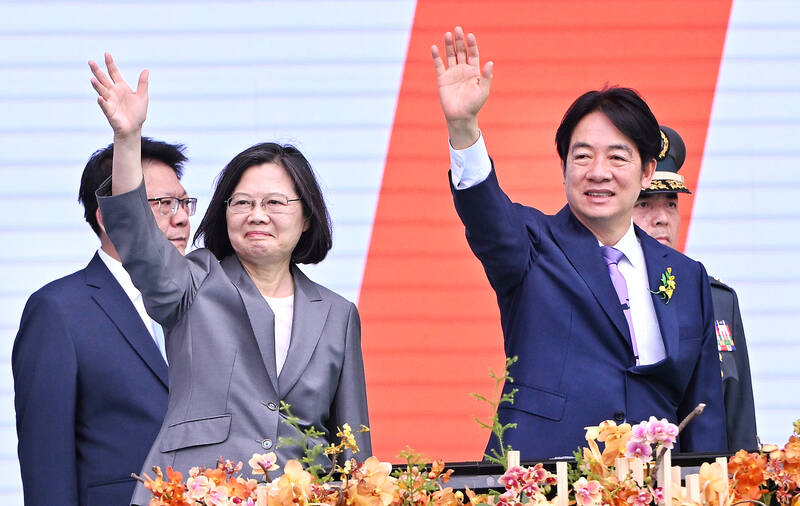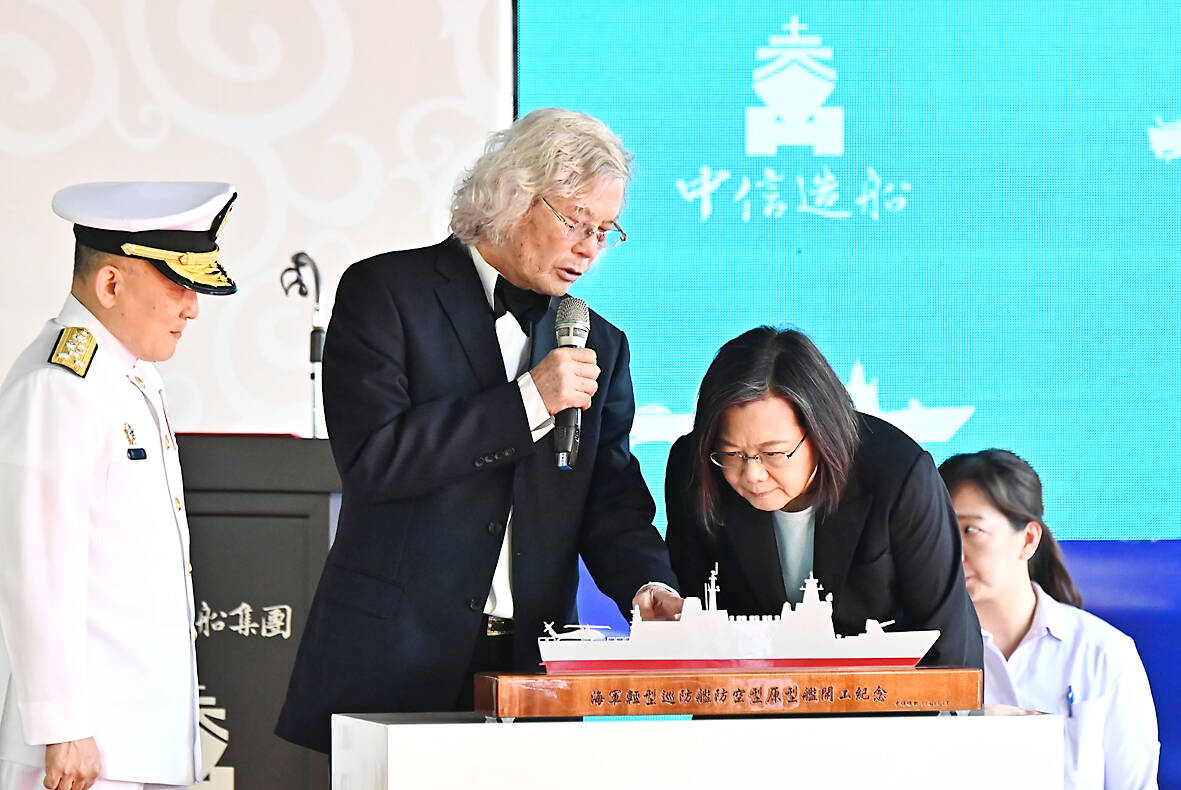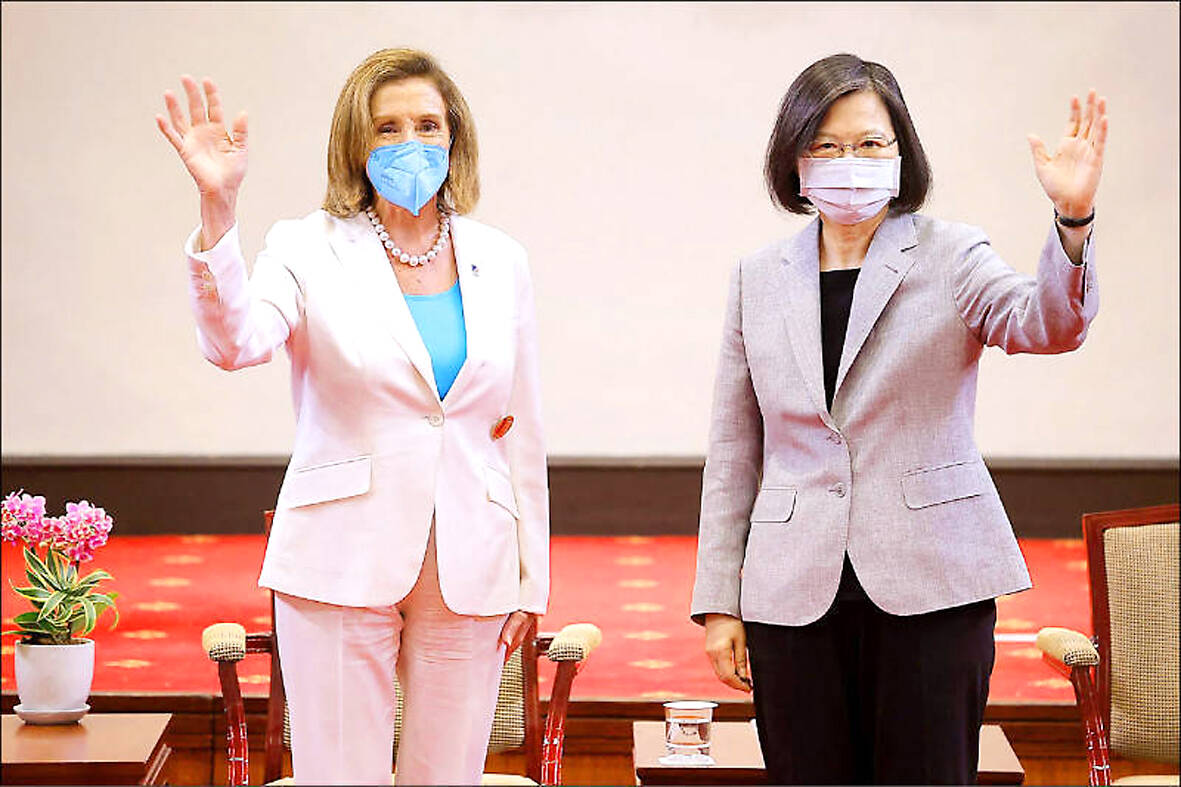On present indications, the Tsai Ing-wen (蔡英文) era will go down in history as successful. Her government’s periodic controversies will largely be forgotten, while the highlights and general stability will be remembered — except in relations with China
Of course, subsequent events could change her historical legacy. American President Ronald Reagan’s legacy got a big boost from the fall of the Berlin Wall soon after he left office, while Neville Chamberlain’s legacy took a big hit when the European theater of World War II broke out.
The Lee Tung-hui (李登輝) era is mostly remembered for the transition to democracy. The Chen Shui-bian (陳水扁) era was filled with chaos, the assassination attempt on him and vice president Annette Lu (呂秀蓮), the Americans blaming Chen every time the Chinese got upset regardless of whether it was his fault or not, the Red Shirt protests and of course, the corruption.

Photo: Liu Hsin-de, Taipei Times
The Ma Ying-jeou (馬英九) era will be remembered for his opening up vigorously to China to pave the way for “reunification,” vast armies of Chinese tour groups, the massive and historic Sunflower movement that brought his efforts to a halt, and that his promised economic boom that opening to China was supposed to bring totally failed to materialize.
In most respects, the Tsai era has been stable, economic growth respectable and Taiwan’s role on the world stage vastly improved.
That her tenure is broadly viewed as successful by the public is borne out in the numbers, with polling showing her at around roughly 50 percent approval at the end of her term, which is strikingly high for any leader worldwide after eight years in office. A Mirror Media poll found that 54.1 percent of respondents were “satisfied” with her term in office, though only 19.3 percent counted themselves as “extremely satisfied.”

Photo: Lee Hui-chou, Taipei Times
Formosa’s final poll of her presidency showed that 49.7 percent had confidence in her. For comparison, they printed similar polling by other outlets conducted at the end of the Chen presidency that had him at only 20.5 percent and Ma similarly only garnered 28.9 percent.
It is also telling that she won two landslide national elections in a row, and that William Lai (賴清德) won running on a campaign of being Tsai 2.0, albeit with only a plurality. Though due to differing district sizes and the way the party list legislative seats work, in this year’s elections her Democratic Progressive Party (DPP) caucus came out slightly smaller than the Chinese Nationalist Party (KMT) caucus in the legislature, the DPP actually got 613,822 more votes in district races and 217,486 more votes in the party list vote, meaning they won the popular vote overall.
CHINA, SOVEREIGNTY AND NATIONAL IDENTITY

Photo: Wei Kuo-chin, Taipei Times
Taiwan’s foreign policy, sovereignty, national identity and relations with China have undergone a sea change in the last eight years. In part, Tsai was following the new evolving popular consensus following the Sunflower movement, but in other ways she forged a new consensus that has also proven popular in polling.
When she responded in a now famous BBC interview that Taiwan does not need to declare independence because the Republic of China, Taiwan (ROC, Taiwan) is already independent, she upended the debate domestically and underscored a new identity on the world stage. While this case was not new, it was Tsai who popularized it.
The Sunflower movement and subsequent polling showed that the public was deeply concerned about becoming too reliant on China and allowing them too much influence and power. Tsai stood firm on Taiwan sovereignty by refusing to accept China’s “one China principle” or the so-called “1992 consensus.”
This refusal to bow to the Chinese Communist Party (CCP) was not well-received in Beijing and they retaliated by cutting off market access in China for many products and blocking outbound tourists to Taiwan, lopping off around US$4 billion in revenue in a single year. However, this was restored within just three years or so by tourists from other countries, most notably Japan.
Just this year, the US surpassed China as Taiwan’s largest export market, while trade with ASEAN states continues to grow, all reducing dependence on China economically. Tellingly, the proportion of Taiwanese working in China has fallen from 62.2 percent of total Taiwanese working abroad in 2011 to just 37.5 percent in 2022.
The CCP also cut off all direct talks with “Taiwan authorities” in retaliation for not compromising on the loss of sovereignty implied by the “1992 consensus,” which in the CCP version states there is one China and Taiwan is a part of it, and in 2019 CCP Secretary-general Xi Jinping (習近平) also appeared to tie it to the “one country, two systems” that they have been undermining in Hong Kong, and is also deeply unpopular in Taiwan. The CCP has never accepted the KMT addition of “both sides with their own interpretation,” and the KMT vigorously protested against the addition of “one country, two systems.”
As president, Tsai consistently offered talks in a calm, measured manner, but insisting on parity and mutual respect and ruling out any preconditions, such as accepting the “1992 consensus.” A trained diplomat and former head of the Mainland Affairs Council (MAC), Tsai has shown a gift for choosing words very carefully that outlined a firm stance, but without giving the Chinese side much to complain about with any specificity.
This resulted in CCP propaganda largely portraying both Tsai and the DPP as “separatists against the will of the people on both sides of the Taiwan Strait and against the tide of history.” They would also periodically make insinuations about Tsai being an unmarried woman.
Already, incoming President Lai’s choice of terms in his inauguration speech are being attacked in CCP propaganda with more specificity than in similar speeches given by the more experienced Tsai.
DEFENSE AND NATIONAL SECURITY
On the sharp and pointy bits of foreign policy — the military — Tsai’s legacy is quite mixed. Much of it is either glass half full, or half empty depending on how one looks at it.
Another way the CCP retaliated has been to unilaterally change the military status quo in the Taiwan Strait, with a much stronger emphasis on gray zone incursions into Taiwan’s Air Defense Identification Zone (ADIZ) and totally disregarding the previously honored Davis Line that had been established in the 1950s along the median line of the Taiwan Strait as an unofficial “do not cross” line by armed forces on both sides. The CCP’s armed wings, the People’s Liberation Army Navy (PLAN) and Air Force (PLAAF), used the visit of then-US House speaker Nancy Pelosi as an excuse to conduct live-fire drills around Taiwan, a practice they periodically reprise.
This is very bad for Taiwan. It increases significantly the risks of an accident, and that could lead to war.
It is extremely taxing on Taiwan’s pilots and planes, and fuel and maintenance budgets have skyrocketed. The Chinese side is gaining valuable information on Taiwan’s capabilities, responsiveness and in training their personnel in preparation for an invasion.
However, in spite of CCP and KMT attempts to pin the blame for this on Tsai’s administration and the DPP, the reality is that the responsibility for this lies on the Chinese side. Polling has consistently shown that the “1992 consensus” is extremely unpopular with Taiwanese, and Tsai was upholding the wishes of the voters who elected her.
Tsai did increase military spending from less than 2 percent of GDP at the end of the Ma era, but only to around 2.5 percent, still a far cry from the 3 percent she campaigned on in the run-up to the 2016 election. It is true that only a certain amount of financial growth can be usefully incorporated on any given year, but she had eight years to achieve the 3 percent target.
On the plus side, under her tenure considerable sums were spent on upgrading the domestic military industry, including on ship and submarine building, drone technology, missiles and more. Her administration also ordered large amounts of armaments from the US, but there is a large US$19 billion stalled backlog due to delays on the American side and many question the emphasis on purchasing flashy, expensive items like fighter jets and tanks instead of focusing on cheaper, more flexible asymmetric items as part of a “porcupine” strategy.
One big success has been to restore the mandatory conscription period to one year, up from the by all accounts nearly useless four months. Promisingly, there is a lot of talk of improving the quality and utility of the training as well as an increase in American training available, though this may take time to produce results. Strangely, and possibly unconstitutionally, conscription is only mandatory for males, which is a self-inflicted limitation in a nation that would need all hands on deck in the event of an invasion.
Another very important goal that Tsai set, though it is hard to measure how successful her efforts have been, has been to build up more trust in the military among not just the public at large, but also to build trust between the military and the DPP. The DPP was formed out of opposition to the KMT-led, one-party state and the martial law that enforced it, and the military has traditionally been a very KMT-centric institution, while the DPP’s early relationship with the military was many of their founders serving jail time after being jailed by the feared Taiwan Garrison Command.
If you are interested in this history and its importance, Academia Sinica scholar Nathan Batto on his superb Frozen Garlic blog explores this topic at length in a recent post titled simply “Tsai’s legacy.”
Courtney Donovan Smith (石東文) is a regular columnist for Taipei Times, the central Taiwan correspondent at ICRT FM100 Radio News, co-publisher Compass Magazine, co-founder Taiwan Report (report.tw) and former chair of the Taichung American Chamber of Commerce. Follow him on X: @donovan_smith.

On April 26, The Lancet published a letter from two doctors at Taichung-based China Medical University Hospital (CMUH) warning that “Taiwan’s Health Care System is on the Brink of Collapse.” The authors said that “Years of policy inaction and mismanagement of resources have led to the National Health Insurance system operating under unsustainable conditions.” The pushback was immediate. Errors in the paper were quickly identified and publicized, to discredit the authors (the hospital apologized). CNA reported that CMUH said the letter described Taiwan in 2021 as having 62 nurses per 10,000 people, when the correct number was 78 nurses per 10,000

As we live longer, our risk of cognitive impairment is increasing. How can we delay the onset of symptoms? Do we have to give up every indulgence or can small changes make a difference? We asked neurologists for tips on how to keep our brains healthy for life. TAKE CARE OF YOUR HEALTH “All of the sensible things that apply to bodily health apply to brain health,” says Suzanne O’Sullivan, a consultant in neurology at the National Hospital for Neurology and Neurosurgery in London, and the author of The Age of Diagnosis. “When you’re 20, you can get away with absolute

May 5 to May 11 What started out as friction between Taiwanese students at Taichung First High School and a Japanese head cook escalated dramatically over the first two weeks of May 1927. It began on April 30 when the cook’s wife knew that lotus starch used in that night’s dinner had rat feces in it, but failed to inform staff until the meal was already prepared. The students believed that her silence was intentional, and filed a complaint. The school’s Japanese administrators sided with the cook’s family, dismissing the students as troublemakers and clamping down on their freedoms — with

As Donald Trump’s executive order in March led to the shuttering of Voice of America (VOA) — the global broadcaster whose roots date back to the fight against Nazi propaganda — he quickly attracted support from figures not used to aligning themselves with any US administration. Trump had ordered the US Agency for Global Media, the federal agency that funds VOA and other groups promoting independent journalism overseas, to be “eliminated to the maximum extent consistent with applicable law.” The decision suddenly halted programming in 49 languages to more than 425 million people. In Moscow, Margarita Simonyan, the hardline editor-in-chief of the